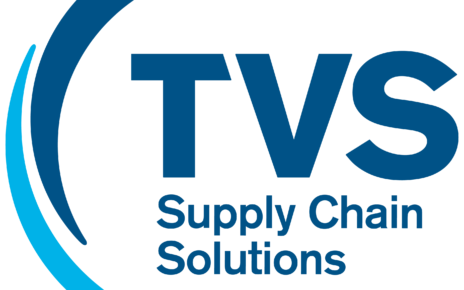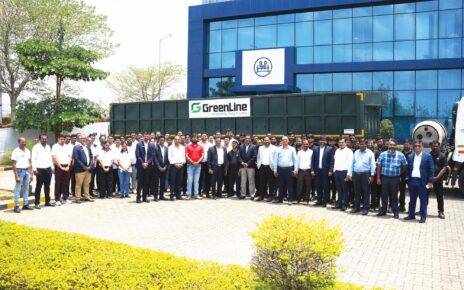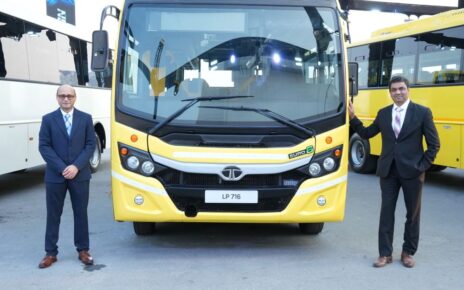
In an exclusive interview with Vandana Laddha, Director at Shivani Carriers, Rajesh Rajgor uncovered how this family-run company grew from a modest parcel booking operation into a key player in India’s full truckload (FTL) logistics space. Built on the pillars of innovation, operational discipline, and a technology-first mindset, Shivani Carriers shows how logistics businesses in India are evolving to meet the demands of a faster, greener, and more digitised economy.
India’s logistics ecosystem is currently undergoing structural transformation. Infrastructure expansion, green regulations, and digital integration are no longer optional; they are essential. In this shifting landscape, Shivani Carriers has not only adapted but taken proactive steps to redefine its value to clients. “We started small, but the vision was always long-term. Every step we took was toward becoming more reliable, more efficient, and more valuable to our clients,” says Vandana Laddha, reflecting on the company’s evolution.
The business was formally established in 1995, but its roots trace back to the 1970s. By 1998, the company had moved into FTL contracts, and 2003 marked a defining leap; acquiring its own fleet. This shift gave Shivani Carriers end-to-end control over operations, significantly improving its service consistency and customer trust.

“Owning our fleet changed everything. It gave us the power to control delivery timelines, vehicle hygiene, safety protocols, and above all, service reliability. This decision proved invaluable during the lockdown period, when the only reason we were able to continue delivering because we had our own fleet on the ground,” adds Laddha.
Fleet Strength and Recent Achievements
Today, Shivani Carriers operates a fleet of 360 vehicles, including six-wheelers, nine-tonners, 14-wheelers, trailers, and custom-built bulkers from the stables of OEMs like Tata Motors, Volvo Eicher andMahindra. This diversity allows them to cater to a wide range of sectors; from FMCG and paints to chemicals and agri-commodities. Leading brands like ITC, D-Mart, Reliance Retail, PepsiCo, Tata Chemicals, Nirma, and Asian Paints rely on their services.
One of the company’s most defining achievements came in 2018 when it was recognised as the “Most Innovative Supplier.” Among the whole Tata Group. Shivani Carriers had developed a customised bulker solution for Tata Chemicals to transport soda ash light in loose form, delivered directly into silos; reducing costs and increasing handling efficiency. “We don’t believe in just doing what’s asked, we look at the bigger picture. Can we save time? Can we reduce costs? Can we deliver more safely? That’s how we approach every project,” says Laddha.

The company now operates across 23 branches spanning Maharashtra, Gujarat, Madhya Pradesh, Uttar Pradesh, Chhattisgarh, Tamil Nadu, Telangana, Karnataka, Haryana, Punjab, and West Bengal. This strategic spread places Shivani Carriers along India’s most vital freight corridors, allowing them to serve both large-volume manufacturers and emerging regional hubs.
“Our physical network is a key advantage, it allows us to respond fast, stay close to customers, and reduce empty hauls. Location matters more than ever,” says Laddha.
Emerging Trends Reshaping Trucking and Logistics
India’s highway infrastructure has undergone a massive upgrade, with four-lane roads now the norm across major routes. These improvements have not only enhanced vehicle uptime but also transformed the driver experience, leading to better safety, lower maintenance costs, and faster turnarounds. “Four-lane roads have transformed the whole driving experience. Drivers are more relaxed, safer, and the wear and tear on our vehicles has reduced significantly,” notes Laddha.
Beyond infrastructure, regulatory shifts like the implementation of BS VI norms and mandates for air-conditioned driver cabins are pushing the industry toward cleaner and safer operations. But while these advances are welcome, challenges such as high toll fees and cumbersome e-challan systems persist. “We’re seeing real progress, but it’s uneven. Operational efficiency improves, but compliance costs and unpredictability still affect margins,” she says.
The post-pandemic surge in e-commerce has changed expectations around speed, traceability, and tech integration. Companies like Shivani Carriers, with their owned fleets and digital backbone, are in a stronger position to serve this evolving demand.
“Clients expect speed, visibility, and a partner who can think on their behalf. That’s where we find our edge,” adds Laddha.
Driving Efficiency Through Technology and Sustainability
Technology is deeply embedded in Shivani Carriers’ operations. Every truck is fitted with advanced telematics to track fuel use, route adherence, idling, harsh braking, and even neutral gear coasting. These metrics are fed into training and incentive programs that continuously refine driver behaviour. “Technology is not an accessory, it’s our backbone. From route planning to preventive maintenance to cost control, everything is data-driven,” she says.
The company’s ERP system is integrated with e-way bill portals, banking APIs, and toll and fuel payment gateways. This real-time data loop has significantly improved accounting efficiency, compliance tracking, and customer communication.
All vehicles comply with BS IV or BS VI norms. The company is also piloting Advanced Driver Assistance Systems (ADAS) to enhance safety and is exploring AI for predictive maintenance.
“Our clients care about sustainability; and so do we. A greener fleet isn’t just good for the environment, it is good for the business,” Laddha remarks. The broader vision includes IoT-enabled health monitoring and AI-driven route optimisation to further cut emissions and improve delivery performance.
Adapting to Changing Customer Expectations
Shivani Carriers views itself as a logistics partner, not just a transporter. Whether it’s designing custom bulkers or advising on distribution routes, the company brings consultative value to the table, especially for large-volume clients with specific requirements. “Today’s clients don’t just want trucks, they want solutions. And they want a partner who understands their business deeply,” she shares.
With its own fleet and widespread presence, the company offers unmatched reliability during market fluctuations. Seasonal peaks, fuel price volatility, or regulatory bottlenecks don’t easily disrupt its service capabilities. “Our structure gives us agility, clients appreciate that we can scale up or adjust without delays or excuses,” she adds.
Transparency is a non-negotiable. Clients get real-time tracking, digital delivery updates, and compliance visibility; aligning with modern supply chain expectations. “Visibility builds trust. Our systems are designed to keep clients informed at every stage,” says Laddha.
Navigating the Road Ahead: Opportunities and Challenges
As uncovered during the interview, Shivani Carriers sees high growth potential in chemicals, paints, agri-commodities, and FMCG sector. But before chasing expansion, the company is focusing on strengthening its core, enhancing vehicle utilisation, optimising costs, and streamlining internal processes. “Our focus this year is internal correction, better systems, sharper processes, and stronger teams. You can’t grow well if your base isn’t strong,” says Laddha with clarity.
Driver availability remains one of the biggest industry-wide challenges. With fewer young professionals entering the field, Shivani Carriers invests heavily in driver retention and skill-building. “If I find a young driver aged 26 or 27, I genuinely feel respect. It takes courage today to enter this profession, it’s not glamorous, but it’s vital,” she says. She is working closely on this. Meeting with drivers and focusing on their driving performance is her daily routine.
While infrastructure has improved, highway amenities for drivers, like rest areas, clean food stops, and medical facilities, are still lacking. This affects driver morale and long-haul performance. “We can only train and equip so much. The ecosystem needs to respect and support the drivers more,” says Laddha.
Shivani Carriers is not in a hurry to grow for the sake of numbers. The company is choosing resilience over reckless expansion, investing in its people, systems, and fleet to ensure it remains a dependable partner for the long run. “We’ve never been afraid of change. In fact, we look forward to it. That’s how we’ve survived, and that’s how we’ll lead,” concludes Laddha.




